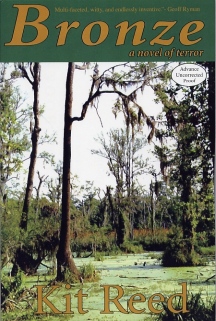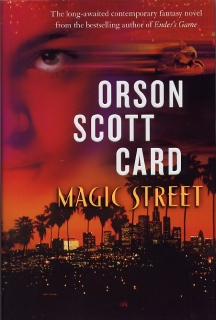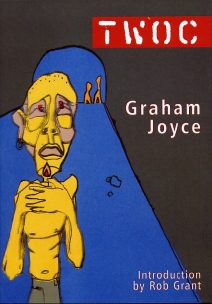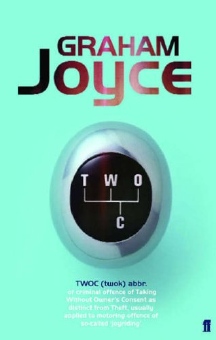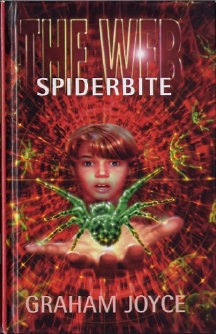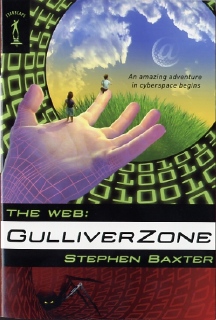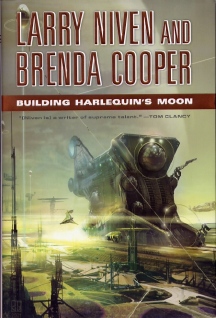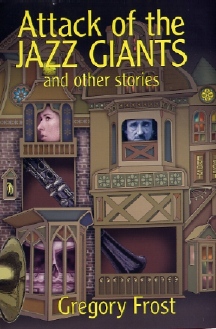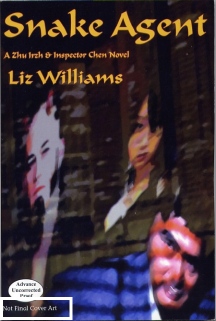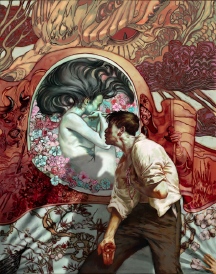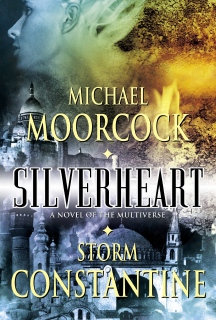|
|
|
This Just In...News from the Agony Column
|
07-15-05: Kit Reed is 'Bronze' |
|||
Dark
Arts & The Internet
'Bronze' starts out in territory familiar to Reed's readers. Jude Atkins has met a man over the Internet. Readers who enjoyed Reed's cautionary tale about Internet chat-room romances, '@expectations', will know from the get-go that this romance is not going to be big on happiness. Traveling to South Carolina to meet Peter Benedict, the man she hopes will become her husband, Joan prays that this will be the one, Peter will be the man she's hoped for. As if. And how many Internet romances turn out so well? Look, face it, the second you fire up an Internet romance, chances are that you're going to find your life is rapidly beginning to resemble a horror novel. Even though you can't send say, a human finger via email. What else would you expect? Of course, you might not be too surprised to end up in 'Silence of the Lambs'. You surely would be surprised to end up in 'Bronze', where a dark family legacy combines with art to threaten your life. Reed's new novel is worth celebrating not just because we have more writing from this talented veteran of horror, science fiction and mystery. This time around, with Night Shade handling the publication, we can expect a beautifully bound piece of literature. And while the cover art for the proof is yards beyond the typical blank cover with letters, Jason over at Night Shade Books tells me that no less than Edward Miller is doing the cover art for this novel. Alas, it's not done yet, but stay tuned. We'll happily presume that the artist is not going to the lengths seen in the novel. But be careful if Miller contacts us via the Internet. |
|
07-14-05: Orson Scott Card on 'Magic Street' |
|||
A
Long, Strange Trip
As for the novel itself, I guess we'll have to get used to the fact that horror novels no longer get billed as horror novels. Twenty years ago, this would have been billed as "The new horror novel from the bestselling author of Ender's Game," instead of "The long-awaited contemporary fantasy novel from the author of Ender's Game." Hmm, some things change, and some things don't. While horror has shed its skin and become either "contemporary fantasy" or "dark fantasy", Card is still weighed down and buoyed up by 'Ender's Game'. And the book is still in development as a movie, though we have word that it is getting closer to being filmed. Or not filmed, because in the intervening years, technology has surged ahead, and it's likely to be taped using digital cameras of some sort. And thus both the science fiction writer and the science fiction novel find themselves the victim of technology's plodding pace, which only slightly exceeds commerce's plodding pace. So, yes, we'll have to live with the death of horror literature even as horror films start showing up on a weekly basis. Do you think that if they started calling these movies "contemporary fantasy" that the glut would eventually kill off the literary equivalent? In the interim, we've got a brand new novel from Orson Scott Card, a standalone work that was long in coming and from which we've seen some scenes. Let me explain. Sometime back in 1999, Card tells us in his Acknowledgements, his friend in Los Angeles, Roland Bertrand Brown, who grew up in a black-middle class family, asked Card why Card had not written a novel a with a black hero. Card pointed out that Arthur Stuart, of the Alvin Maker books, was black and Brown was right back at him pointing out Stuart's sidekick status. Card was understandably reluctant to write from the point of view of a black man, as he's as white as they come. Still, the idea intrigued him. Brown inveigled Card with anecdotes from his youth, and the seeds of this novel were planted. While visiting his cousin Mark in southern California, Card managed to get a ride up to Baldwin Hills, a city squarely between the two places I lived when I grew up in Southern California. I can testify to Card's assertion that Baldwin Hills is a gorgeous and evocative location. I used to drive around it in my roaming days. And I can see why Card would want to set a novel about magic seeping into our world there. His plan was to call it Slow Leak. His first attempt to write the novel resulted in the short story "Waterbaby", first published in Galaxy Online in 2000. (Galaxy Online is now offline, alas.) His second attempt "Keeper of Lost Dreams" showed up in 'Flights: Visions of Extreme Fantasy', recently mentioned here as a great place to find great fiction, now even more tangled in the Agony Column Web. But it gets even more tangled. Remember 'Posing as People', both covered in the news and reviewed here? Aaron Johnson, who wrote one of the plays based on Card's stories and produced them when they ran in Los Angeles, provided Card with the maps of Baldwin Hills that Card used when writing the novel and an actual place to write the novel while the plays were running. The result is a novel steeped in magic and more importantly, perhaps -- Shakespeare. Mack Street is a mystery child who grows up in a series of homes in Los Angeles. He's always known he's different. But when he sees a skinny house between two other houses -- a house that nobody else can see, he begins to find out just how different. Slipping through the house into the back yard, he finds it to be a portal to a world a lot like ours, but shot through with magic and power. He's no longer so different here, but his actions have consequences in the world we all know, of concrete and contracts. He's playing a part in a drama that has worked its way into our reality before. Card is a scholar, a pro and an imaginative guy, and that assures me that 'Magic Street' -- whether it's a contemporary fantasy or a horror novel, will be even more interesting than its origins. |
|
07-13-05: Graham Joyce Caught TWOC; Larry Niven and Brenda Cooper Are 'Building Harlequin's Moon' |
||||||||||||
PS
Publishing's Signed, Limited British Edition of Joyce's Second YA Novel
The general vibe I got was that 'TWOC' would be a fairly realistic novel, grounded largely in the goings-on of young criminals. But I should have known better. That's not the case at all. Joyce is reliably and happily up to his usual supernatural and psychological tricks, offering a story that is sublimely surreal and unpleasantly spot-on as regards to the lives of teenagers. Trust me, I know about this.
Matt's glittering hell, lined with the latest electronics, is the result of his activities as a twocer. You'd expect that after the crash, Jake being dead, would be a non-issue, but that's not the case. Matt has to crank up his annoying teenage music just to blot out Jake's tapping on the window. Matt understandably -- even to a reader who is the parent of teenagers -- thinks that being dead, Jake should leave him alone. But even if he did, Matt's father would still Talk To Matt In Capital Letters. Lord Knows, I Talk In Capital, SOMETIMES ALL CAPITAL LETTERS. As Jake begins to appear to Matt in stranger and stranger clothes, Matt talks big and acts like he owns the world. But his memory of the accident may be just a bit off. Joyce has set himself up with another winner here, a well-informed look into the mind of a guilt-ridden teenager, though perhaps that description is a bit redundant. At 205 pages in the smallish PS Publishing format, you've got a very sharp, short shock ahead of you. And remember this -- anything by Graham Joyce is essential reading. Even a quick glance will assure the most skeptical reader that Joyce has written his usual intensely artistic but compellingly readable novel here. It's just shorter and about a teenager, that's all. Oh, and his dead brother.
Readers will note that I mentioned in the headline that this is Joyce's second YA novel. His first YA novel was 'The Web: Spiderbite', part of Orion's prescient YA series first published eight years ago. The series, edited by the brilliant Simon Spanton, brought writers like Joyce, Peter F. Hamilton and Stephen Baxter into YA fiction to write about the world in 2027, where the Web is a bit more interactive than it is today. Smart concept, should have been an easy sell.
OK, so the final bit about 'TWOC' is the US publication. The deal is that it is being edited by an agreeable soul over at the YA division and it will be a bit different than the UK version. The upshot of this is that you'd be well advised to the pick up the PS version and the Faber version if youre the collector type (who would consume your own flesh before eating a book should you be trapped on an island with an appropriate amount of heroin). That way you can take the Faber copy to the Tacqueria Vallarta, or Tacos Moreno for your lunchtime reading enjoyment. And you can read the PS version on your back porch. If you're lucky you can do this to the sound of your teenager chopping wood in the backyard, my soundtrack as I write this little missive. Thunk. Thunk. Thunk. Axe hits wood. Teenagers in the back yard. They don't really need the axe to be scary. But it helps. |
||||||||||||
Retooling
the Generation Starship
So, the generation starship shtick is, for my readers who only dabble in SF, based on the idea that we're not traveling Faster Than Light. That hibernation idea, you know, freeze 'em till they arrive after many years of transit -- that didn't pan out any more than FTL travel. So instead, humans get together and build a big old city in space, hook up some motors and set out for the long haul, traveling to another star over say hundreds or even thousands of years. Many generations pass and the starship arrives at its destination, ready to colonize. In 'Building Harlequin's Moon', Niven and Cooper add the latest veneer of technology to this premises, so that the starship John Glenn flees a solar system populated by too many rogue AI's, machine/human hybrids and rampant, dangerous nanotech. It's as if a batch of yesteryear's science fiction authors get together to flee the results of today's fiction, to establish a place to write about big rockets, driven by hardy men with square jaws. But -- oops! -- they end up in the wrong place, low on gas, well, antimatter. So they come to halt and set up a slave-state to mine more antimatter and get to their final destination. Rachel Vanowen is a slave wondering what's in store for her when the generation ship has topped off and is ready to roll. She suspects those on board aren't going to give her a cookie. As a reader, I suspect that those on board that ship have not succeeded at leaving their problems behind them, any more than Niven and Cooper have written a military exercise book. And as a reader, I suspect that I'll now have to pay attention not only to these two as a team of writers, but separately as well. Just what I need: more coffee! |
|
07-12-05: Gregory Frost Withstands 'The Attacks of the Jazz Giants' |
||||||
An
Outstanding Illustrated Short Story Collection From Golden Gryphon
As usual, Golden Gryphon starts their offering by putting the quality where it counts for readers, that is, in the writing. Gregory Frost is the kind of under-known, heavily acclaimed writer that this publisher specializes in. His latest novel was 2003's 'Fitcher's Brides' an entry in Terry Windling's acclaimed "Fairy Tales" series, recast the Bluebeard story into a terrorizing horror novel. Set in New York in the 1830's, 'Fitcher's Brides' recreates the insular community of Elias Fitcher, a mesmerizing preacher, who has gathered his flock to await the end of the world. When the Charter family joins this so-called utopian community, two of their three daughters are quickly subsumed by the voracious preacher, and Catherine, the remaining daughter, must connect clues given by her sisters and use her own wits to keep from being drawn into Fitcher's fate. Frost also works on plenty of intriguing non-fiction projects, working as a researcher and writer for Science Frontiers. But like many writers in the science fiction world, Frost finds his forte in the world of the short story, novella, novelette -- whatever length you slice it at, it ain't a novel. And that's fine, because the science fiction genre thrives on the short story. My first encounter with Frost's short fiction came when I attended the 2002 Worldcon in Toronto, wherein his story 'Madonna of the Maquiladora' was nominated for a Hugo award. You'll find that story here. Written from an evocative and compelling second-person point-of-view, Frost's story covers a subject that was featured in Kem Nunn's latest novel, 'Tijuana Straits'. Another story included here, 'How Meersh the Bedeviler Lost His Toes' was a finalist for the Theodore Sturgeon Memorial Award. Frost is one of those great science fiction writers who roam the entire literary landscape, offering up works of horror, fantasy and in this collection, 'The Road to Recovery', an interplanetary "road picture" with offhand salutes to Hope & Crosby and even Flash Gordon. Readers looking for the kind of variety that you find in the works of Ray Bradbury will find themselves in familiar hands here. The introduction is by cross-genre and best-selling favorite Karen Joy Fowler. Frost himself offers succinct comments after each story. John Kessel (great name) provides an incendiary political afterword he calls 'The Damned Human Race', and written much of this article while on hold trying to get my four year-old Maytag washer competently repaired or replaced, well, I'm of a mind to agree. Please visit their website long enough so that they can see the hits. Oh the humanity!
So your day is decided, no? A nice relaxing trip down to the bookstore -- or a post-Agony Column visit to Golden Gryphon's website -- to pick up this delightful collection. We hope to have a thorough, in-depth review from harum-harumph any day now. In the interim, I suppose, I must now return "To Hell Again" , in this case on-hold hell. Hang on, let me check the time so far....27'20"! Damn. Can you imagine how much muzak has gone directly into my right ear? Were I not busy writing about it, I might have spent the time reading 'Attack of the Jazz Giants', an attack I can assure you, that I would die to hear. (Stay tuned tomorrow for more exciting washing-machine frustration! And please follow this link to the Maytag site, as well as to avoid buying their products.) |
|
07-11-05: Liz Williams 'Snake Agent'; Michael Moorcock and Storm Constantine 'Silverheart' |
|||||||||
Blurring the Lines: Night Shade Books and Pyr Books Fill In a Sizable Niche
Well, now Grant is publishing Stephen King in conjunction with Scribner's and Scream/Press is no more. But the small press is still with us in varying forms, most of them decidedly not small. The two books I have up for discussion today are perfect examples. On one hand, we have the started-as-a-small-press Night Shade Books looking up and competing head-to-head with the big NY presses in terms of price and product. On the other hand, we have the address-in-NY publisher Prometheus Books -- not exactly a big NY press, but a long-lived, located-in-NY press with big-press distribution -- firing off the Pyr imprint, which offers all the taste and cover art and nicely-designed books that you expect from the small press, only they're actually rather a larger press. We have two different publishers addressing the readers who loved the midlist, which has been rather abandoned by the traditional NY publishers, and doing one hell of a good job at it. I believe that I have been not-so-gently suggesting that although Liz Williams seems well-served sales-wise by her publication in mass market paperback originals, the quality of her work is such that is certainly deserved hardcover publication. Well, thanks to Jeremy & Jason at NightShade, that's about to become the case. 'Snake Agent' (Night Shade Books ; September 2005 ; $24.95) has all the hallmarks of a big-press, hard-cover production. Lookit that price -- that's not a small press price. But on the other hand, you know that Night Shade Books are beautifully produced, sewn-cloth hardcovers. You need not fear that the artwork I have displayed here is the final art. Night Shade assures me that this is not the case, the cover assures me that this is not the case, and sweet reason assures me that this is not the case.
But you know, as much as I love great cover design, and as much as it sucks me right in, when it comes to Liz Williams, the quality comes where it counts, in the writing. Most importantly, what we have here is the beginning of what appears to be one of the most intriguing series I have seen in a long time. Now, before I get down to the meat of the matter, let me add this up as it just came into my tiny brain. It strikes me that here we have the first hardcover novel by an acclaimed and award-winning author, printed by one of our most prestigious publishers. It's the first in a mystery/SF/horror genre series. It WILL appear as a mass-market paperback sometime in the actual future. Step ahead about five, six years down the line. Think about how popular this series could very well be, and about valuable a simple, low-cost first edition hardcover will be. Think about how much you'd dish out now for say, a first edition of Jasper Fforde's 'The Eyre Affair'. Now ask yourself before you go the Night Shade website to place your order: do you want to order just one? Damn it! I can't tell you how easy it is for my brain to get me in all sorts of trouble. OK, so now to the meat of the matter, the actual written part. From the get-go, it gets my attention because its set in Singapore, and I've actually been to Singapore. It's a very strange city-state, and it is exactly that. There is one honkin' city -- Singapore -- and it's surrounded by what looked to my eye by a ring of projects, huge apartment blocks where most of the people live. Set in the near future, 'Snake Agent' introduces Inspector Chen and Seneschal Zhu Irzh, two counterparts in Singapore Three's Snake Agent Division. They're in charge of all the supernatural crime. So, push John Burdett's evocative and wonderful 'Bangkok 8' fifteen minutes into the future and dial up the supernatural elements and you've got a pretty close bead on what you can expect from Liz Williams' 'Snake Agent'. Chen is a not a popular guy in the department. Seems like most of his colleagues have little trust in the man in charge of dealing with demons, devils, ghosts, gods and goddesses. He's paired with Seneschal Zhu Irzh, described as "one of Hell's own vice officers" to investigate the illegal trade in souls. I frankly dont need to know a whit more than this to see my money flee quickly to Night Shade. You dont want to know more, because the joy in reading is the reading itself, that immersive experience the sublimation to a common short story-code that the writer hands over to the reader so the reader can drop into a world they'd never imagined quite so thoroughly. And really, think of the other readers out there who can latch on to this sort of thing. I mean, John Burdett is being published by Knopf. His stuff is outstanding. To my mind, Night Shade and Williams have the potential to bring both Night Shade and Williams out of the shadows. Buy two? Heck, I'm trying to hold off on three.
'Silverheart' grew out of a 45,000 word "sketch" that fantasy giant Michael Moorcock sent to co-fantasy giant Storm Constantine. Only Moorcock would call 45,000 words a sketch! Feh. Well. This is definitely a match made in heaven, or more precisely, in the center of Moorcock's Multiverse, which as been a part of my mental landscape since...let me figure this out...some, say...1970? 1971? Hell, that's a long time. That's when I read my first Elric novel, and damn if that didn't help seal my love of weird fiction. And it is weird, a raucous, dark, violent combination of fantasy turned upside-down, juiced up with gut-wrenching horror and buoyed up by big-idea science fiction. 'Silverheart' is set in Karadur, a semi-civilized nightmare driven by steam and presided over by the clans of metal. Max Silverskin has exactly six days to discover the secrets of his heritage or die. Rose Iron, the daughter of the powerful Clan of Iron, must ally herself with Max as she searches for the secrets that could save the city's future. Captain Cornelius Coffin is in love with Lady Rose and obsessed with capturing Max. Somebody is going to end up disappointed, but it sure as hell is not the reader. I like Moorcock's work because he just has this dripping, organic, filthy-city vibe down. I've never read Constantine, though I've seen her work in the Ziesing catalogue forever. Now sounds like a good time to start, and this sounds like a great way to start. Originally published in the UK by the lost and lamented Earthlight imprint, Moorcock informs us in his introduction that he and Constantine are hard at work on a sequel. So what you have here is the ends stretching towards the middle, the small press getting bigger and the big press getting smaller. The upshot is that the ol' midlist lives again, and what it turns out to be is that the midlist offers you, the readers, the best of the best. These are the true best sellers -- the best books, and books that are selling to people who will actually, actively, engagedly read them. Imagine that! It's like something out of a combination science fiction, fantasy and horror novel. |
